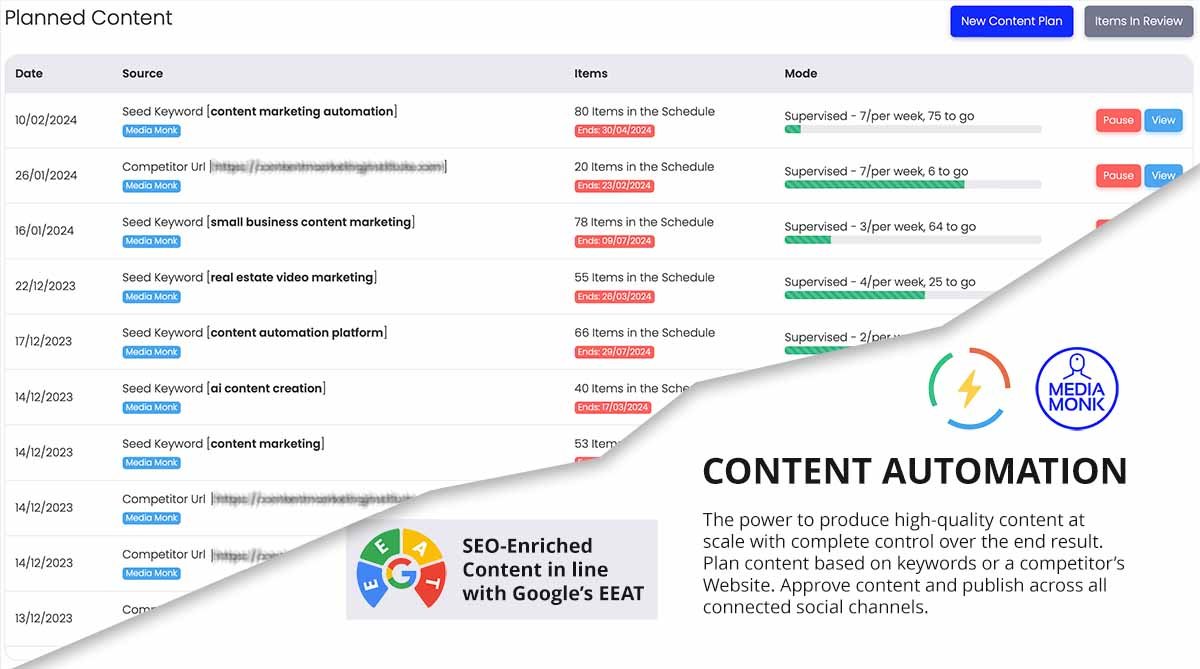Table of Contents
Content automation has become an essential tool for marketers looking to streamline their processes and drive results. In this article, we delve into successful marketing campaigns that have leveraged content automation to achieve their goals. By understanding real-life examples and strategies, businesses can learn how to implement content automation effectively to boost their marketing efforts.
Understanding the Impact of Content Automation in Marketing
Content automation has revolutionized the way marketers create, distribute, and manage their content. By automating repetitive tasks such as content creation, scheduling, and distribution, businesses can save time and resources while maintaining a consistent online presence. This efficiency allows marketers to focus on more strategic and creative aspects of their campaigns, leading to better overall results. The impact of content automation in marketing is undeniable, with successful campaigns showcasing the power of automated content in driving results.
Furthermore, content automation enables marketers to personalize and target their content more effectively. With the ability to segment audiences and deliver tailored content at scale, businesses can engage with their customers in a more meaningful way. This level of personalization can significantly improve the effectiveness of marketing campaigns, leading to higher conversion rates and customer satisfaction. The impact of content automation in marketing is not only in saving time and resources but also in enhancing the overall customer experience.
In addition, content automation allows for better data-driven decision making. By analyzing the performance of automated content across various channels, marketers can gain valuable insights into what resonates with their audience and adjust their strategies accordingly. This iterative approach to content creation and distribution can lead to continuous improvement and optimization of marketing campaigns. The impact of content automation in marketing goes beyond just efficiency and extends to driving more impactful and data-informed marketing efforts.
Exploring Real-Life Content Automation Examples
Media Monk stands as a testament to the power of its platform, embodying the quintessence of ‘practicing what it preaches’. By deploying its sophisticated content automation technology, Media Monk is not only an advocate but also a primary user of its service, ensuring the company ranks highly for keywords crucial to its business. This self-application of its tools serves as a compelling case study for the effectiveness of its AI-driven strategies. Media Monk meticulously curates its content to target specific keywords, engaging in a perpetual cycle of optimization that boosts its visibility and establishes authority in its domain.

The platform’s prowess in identifying and capitalizing on relevant keywords allows Media Monk to consistently outmaneuver the competition in search engine rankings, drawing organic traffic to its site. By continually refining its SEO strategy through the insights gleaned from its technology, Media Monk ensures that each piece of content not only resonates with its audience but also fortifies its online presence. This strategic content curation underscores Media Monk’s dedication to innovation and excellence, showcasing its commitment to delivering results not only for its clients but also for itself. It’s a cycle of success that reinforces trust and credibility in the Media Monk brand, demonstrating to SMEs that with the right technology partner, they too can achieve significant digital marketing triumphs.
Media Monk’s approach to content automation represents a paradigm shift in how businesses tackle the ever-present challenge of content creation. By leveraging advanced AI intelligence and strategic planning technology, Media Monk not only streamlines the content development process but also elevates the quality and relevance of every asset produced. This systematic method ensures a steady output of SEO-enriched content that’s tailored to enhance Media Monk’s digital footprint and engage their audience meaningfully.
The benefits of this approach are multifaceted. With a content planner that taps into the pulse of current trends based on specified keywords and competitive insights, businesses can stay ahead of the curve. The automation ensures that fresh content is continuously cycled through their website and social channels, bolstering their SEO efforts and keeping the audience engaged with new, relevant, and share-worthy material.
For SMEs, Media Monk’s cutting-edge content automation technology offers a golden opportunity to compete with larger players in the digital landscape. It democratizes access to high-level content production, which has traditionally been resource-intensive and difficult to scale. Small and medium enterprises can now:
- Generate Content at Scale: Automate the creation of content, allowing businesses to maintain a robust online presence without the need for extensive manual effort.
- Optimise for SEO: Integrate SEO best practices seamlessly, ensuring that content is optimized to rank well in search engine results and attract organic traffic.
- Ensure Quality and Consistency: Maintain a high standard of content that aligns with brand messaging and audience expectations, thanks to the AI’s understanding of brand tone and style.
- Drive Engagement: Produce content that resonates with audiences, encouraging shares, likes, and comments, which further amplifies reach and engagement.
- Save Time and Resources: Free up valuable time and resources that can be redirected to other critical business areas, such as product development or customer service.
- Analyse and Adapt: Utilize built-in analytics to understand content performance and refine strategies for even better outcomes.
Adopting Media Monk’s content automation technology empowers SMEs to take charge of their content marketing strategies with confidence. It not only simplifies the content creation process but also ensures each piece of content works harder for the business. The result is a smarter, more efficient way to engage with audiences and grow their brand online.
Strategies for Implementing Content Automation Effectively
One key strategy for implementing content automation effectively is to conduct a thorough assessment of the organization’s automation needs. This involves analyzing the various marketing tasks that can be automated, such as content creation, distribution, and scheduling, and identifying the areas where automation can bring the most value. By understanding the specific pain points and bottlenecks in the marketing process, marketers can make informed decisions about which tasks to automate and how to prioritize them for maximum impact.
Setting clear objectives is another crucial aspect of effective content automation implementation. Marketers need to define their goals and KPIs (key performance indicators) to measure the success of their automation efforts. Whether the objective is to increase content production efficiency, improve audience targeting, or enhance campaign performance, having clear and measurable goals will guide the selection of the most suitable automation tools and the implementation of relevant strategies.
Choosing the appropriate automation tools is essential for successful content automation implementation. Marketers should evaluate the available automation platforms and solutions to find the ones that align with their objectives and requirements. Whether it’s a content management system (CMS), a marketing automation software, or a social media scheduling tool, selecting the right tools that integrate seamlessly with existing processes and technologies will ensure a smooth and effective implementation of content automation.
The Role of AI-Powered Tools in Content Automation
AI-powered tools have become an essential component of successful content automation in marketing campaigns. These tools have the capability to analyze large amounts of data and create personalized and targeted content at scale, which is crucial for engaging with diverse audiences. By utilizing AI-powered tools, businesses can efficiently generate AI-generated product descriptions that are tailored to individual customer preferences, leading to higher conversion rates and customer satisfaction.
Furthermore, AI-powered tools have transformed the way marketers approach email marketing campaigns. With the ability to analyze customer data and behavior, these tools enable the creation of personalized and highly relevant email content. This level of personalization not only improves customer engagement but also increases the likelihood of conversions. By leveraging AI-powered tools, businesses can streamline their content automation processes and deliver more impactful and effective email marketing campaigns.
In addition, AI-powered tools have revolutionized the way marketers automate their content processes by enabling the creation of dynamic and adaptive content. With the ability to analyze real-time data and trends, these tools can automatically adjust content to align with changing market dynamics and consumer preferences. This level of adaptability ensures that businesses can stay ahead of the competition and deliver content that resonates with their target audience, ultimately driving better results in their marketing campaigns.
Measuring the Success of Content Automation Campaigns
Measuring the success of content automation campaigns is crucial for marketers looking to optimize their strategies and achieve their goals. By tracking key metrics such as engagement, conversions, and ROI, businesses can gain valuable insights into the effectiveness of their automated content initiatives. This data allows them to make informed decisions about future campaigns and investments, ensuring that their marketing efforts are aligned with their objectives.
Furthermore, analyzing the performance of content automation campaigns enables businesses to identify areas for improvement and innovation. By understanding what resonates with their target audience and what doesn’t, marketers can refine their content strategies to better meet consumer needs and preferences. This iterative approach to content automation not only drives continuous improvement but also fosters a deeper understanding of audience behavior and market trends.
In conclusion, measuring the success of content automation campaigns empowers businesses to adapt and evolve in a rapidly changing digital landscape. By leveraging data-driven insights, marketers can refine their strategies, enhance their targeting, and ultimately drive better results. This iterative approach to content automation not only fosters continuous improvement but also ensures that businesses remain competitive and relevant in the ever-evolving marketing landscape.







